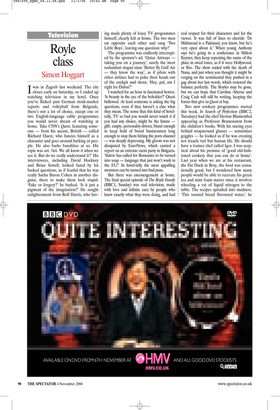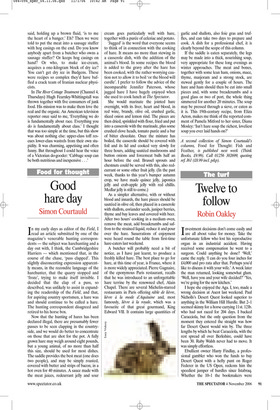Royle class
Simon Hoggart
Iwas in Zagreb last weekend. The city closes early on Saturday, so I ended up watching television in my hotel. Once you’ve flicked past German stock-market reports and volleyball from Belgrade, there’s not a lot of choice, except one or two English-language cable programmes you would never dream of watching at home. Take CNN’s Quest, featuring someone — from his accent, British — called Richard Quest, who fancies himself as a character and goes around barking at people. He also barks banalities at us. His topic was art. ‘Art. We all know it when we see it. But do we really understand it?’ His interviewees, including David Hockney and Brian Sewell, looked fazed by his barked questions, as if fearful that he was really Sacha Baron Cohen in another disguise, there to make them look stupid. ‘Fake or forgery?’ he barked. ‘Is it just a pigment of the imagination?’ He sought enlightenment from Rolf Harris, who hav ing made plenty of lousy TV programmes himself, clearly felt at home. The two men sat opposite each other and sang ‘Two Little Boys’, leaving one question: why?
The programme was endlessly interrupted by the sponsor’s ad, ‘Qatar Airways taking you on a journey’, surely the most redundant slogan since ‘Better fly Gulf Air — they know the way’, as if pilots with other airlines had to poke their heads out of the cockpit and shout, ‘Hey, pal, am I right for Dubai?’ I watched for an hour in fascinated horror. ‘Is beauty in the eye of the beholder?’ Quest bellowed. At least someone is asking the big questions, even if they haven’t a clue what they mean. The sense that this kind of hoteltelly, TV so bad you would never watch it if you had any choice, might be the future glib, empty, personality-driven, bland enough to keep hold of bored businessmen long enough to stop them hitting the porn channel — was deeply depressing. My gloom was not dissipated by EuroNews, which carried a report on an extreme racist party in Bulgaria. ‘Sidrov has called for Romanies to be turned into soap — language that just won’t wash in the EU!’ In hotel-telly the most appalling monsters can be turned into bad puns.
But there was encouragement at home. The final special episode of The Royle Family (BBC1, Sunday) was real television, made with love and infinite care by people who knew exactly what they were doing, and had real respect for their characters and for the viewer. It was full of lines to cherish: ‘Dr Mahmoud is a Pakistani, you know, but he’s very open about it.’ When young Anthony says he’s going to a conference in Milton Keynes, they keep repeating the name of the place in awed tones, as if it were Hollywood, or Rio. The show ended with the death of Nana, and just when you thought it might be verging on the sentimental they pushed in a gag about her last words, which restored the balance perfectly. The Royles may be gone, but we can hope that Caroline Aherne and Craig Cash will still be writing, keeping the forces that give us Quest at bay.
Two new cookery programmes started this week. In Search of Perfection (BBC2, Tuesdays) had the chef Heston Blumenthal appearing as Professor Branestawm from the children’s books. With his staring eyes behind wraparound glasses — sometimes goggles — he looked as if he was creating not treacle tart but human life. He should have a trainee chef called Igor. I was sceptical about his promise of ‘good old-fashioned cookery that you can do at home’. Last year when we ate at his restaurant, the Fat Duck in Bray, the food was sensationally good, but I wondered how many people would be able to recreate his green tea and mint foam starter since it involves wheeling a vat of liquid nitrogen to the table. The recipes spiralled into madness. ‘This toasted bread flavoured water,’ he said, holding up a brown fluid, ‘is to me the heart of a banger.’ Eh? Then we were told to put the meat into a sausage stuffer with hog casings on the end. Do you know anybody apart from a butcher who owns a sausage stuffer? Or keeps hog casings on hand? Or who, to make ice-cream, acquires a one-kilogram block of dry ice? You can’t get dry ice in Budgens. These were recipes so complex they’d have baffled a crack team of Iranian nuclear physicists.
In The River Cottage Treatment (Channel 4, Thursdays) Hugh Fearnley-Whittingstall was thrown together with five consumers of junk food. His mission was to make them love the real and the organic. An American television reporter once said to me, ‘Everything we do is fundamentally about race. Everything you do is fundamentally about class.’ I thought that was too simple at the time, but this show was about nothing else: upper-class toff rescues lower-class wastrels from their own stupidity. It was charming, appetising and often funny. But throughout I could hear the voice of a Victorian do-gooder: ‘Cabbage soup can be both nutritious and inexpensive .. .’



















































































































 Previous page
Previous page